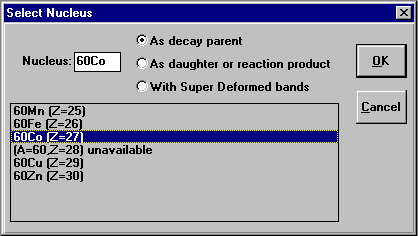Isotope Explorer user's manual





Accessing data
There are three ways of accessing nuclear data with Isotope Explorer:
- Transfer via the Internet from a HTTP-server
- Data stored on a local disk or CD-ROM
- From the WWW, with Isotope Explorer working as a helper application for the browser
Internet transfer
Data can be transferred by Isotope Explorer directly from the
Isotopes Project Web server.
If the file CATALOG0.LOG (see Isotope Explorer files)
is available, the user can select an available nuclide
from the File, Select Nucleus menu:

The user first selects the database from the three options
- As decay parent
- ENSDF decay data sets by parent nucleus
- As daughter or reaction product
- ENSDF data sets by daughter nucleus (final nucleus)
- With superdeformed bands
- A continuously updated (by B Singh, McMaster) database with superdeformed band information
The user can then enter the nuclide specification (e.g. 60Co)
in the text box. As the user starts
writing the mass number of the nuclide, the program displays the
existing entries in the list box below. The intended
nuclide may be selected by double-clicking the corresponding
entry in the list box.
Data from local disk or CD-ROM
A locally stored file in the ENSDF or ENSDF/2 format
is opened using the File, Open local file...
menu.
The whole of the ENSDF database is available in a convenient form on the
Table of Isotopes CD-ROM. When this data structure is
used, the nuclide can be selected with the command File,
Select Nucleus.
Isotope Explorer as helper application to a Web browser
Nuclear data files can be distributed on the Web in the ENSDF, ENSDF/2 format or
as chart databases. The Web browser
will recognize these file types, and launch Isotope Explorer provided
- The server has been configured to transmit MIME type Application/ENSDF
for ENSDF (extension .ENS), ENSDF/2 (extension .ENX) files and
chart files (extension .CHR)
- The browser has been configured to launch Isotope Explorer for the MIME type
Application/ENSDF with extensions
.ENS, .ENX and .CHR




Comments to:
F Chu (program),
P Ekström (manual)
All contents copyright © 1996, Isotopes Project, Berkeley Lab. All rights reserved.
Revised:
